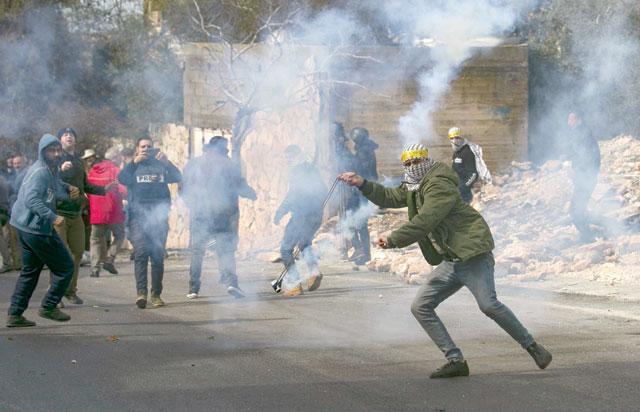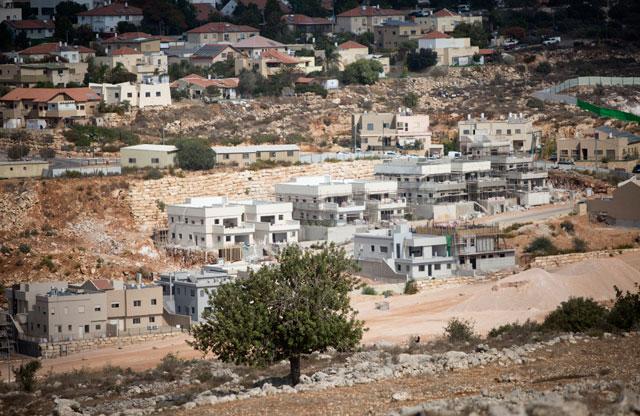You are here
Palestinians expect little but bias from Trump peace plan
By AFP - Jan 25,2020 - Last updated at Jan 25,2020

A Palestinian protester uses a slingshot to return a tear gas canister during confrontations with Israeli forces following a weekly demonstration against the expropriation of Palestinian land by Israel in the village of Kfar Qaddum near the Jewish settlement of Qadumim, in the Israeli-occupied West Bank, on Friday (AFP photo)
RAMALLAH — After US President Donald Trump's announcement that he will finally launch his long-awaited Middle East peace plan this week, the response among many Palestinians Friday was a collective shrug.
Trump said the plan, which has been delayed multiple times, would finally be released by next Tuesday when Israeli Prime Minister Benjamin Netanyahu and his political rival Benny Gantz will meet him in Washington.
But the Palestinian leadership was not invited, amid a series of rows between President Mahmoud Abbas and Trump over the US leader's pro-Israel stance.
In the heart of the West Bank city of Ramallah, where the Palestinian government is based, many people entering a mosque for Friday prayers were not even aware of Trump's announcement the previous day.
Others said they did not expect anything positive from a president they see as totally biased.
"Trump represents no one but himself, and this is a crazy president," said Munther Abu Awad, clutching a blue prayer mat.
"What he announced is in favour of Israel."
Hossam Abdul Raheem, 57, said he expected the plan to be announced and then forgotten.
"This deal will fail completely," he predicted.
"Whatever they do will not affect us as we have nothing to lose."
During prayers, the mosque's sheikh condemned the Trump peace plan, which Palestinians sarcastically label the "deal of the century".
'Working in Israel's interests'
Nasser Nassar, 57, works as a teacher by day and bus driver by night to pay the bills.
He had little positive to say about the peace push.
“Trump considers himself the president of the world and not only the United States, and the fact is he is working in Israel’s interests.”
But he blamed the Palestinian leadership as much as the Israelis for the conditions in the Palestinian territories, where around a quarter of the population lives in poverty.
“The leadership drove us to a place where we are chasing a living and we forgot all important causes.”
Israel has occupied East Jerusalem and the West Bank since the 1967 war.
More than 600,000 Israelis now live there in settlements considered illegal under international law.
Palestinians see East Jerusalem as the capital of their future state and Abbas cut ties with Trump after he recognised the city as Israel’s capital.
The Republican president has taken a series of other steps that have thrilled right-winger Netanyahu but appalled Palestinians.
Israeli media reported what they said were leaks of parts of Trump’s plan, including that it could grant full sovereignty to Israel over Jerusalem and West Bank settlements.
In exchange the Palestinians would get some kind of a demilitarised statehood in the remaining territory.
Trump later tweeted that the reports were merely “speculative” and that the full details would be revealed later.
‘How do you respond?’
Both Israeli and Palestinian analysts were sceptical Friday as to whether the plan could be implemented.
Nour Odeh, a Palestinian political analyst in the West Bank, said the details, if confirmed, would be impossible for any Palestinian leader to accept.
“Trump wants the Palestinians to join Likud [Netanyahu’s party], that’s basically the requirement.
“There is nothing to engage with. I think for the Palestinians and the world, the question becomes how do you respond?”
Ofer Zalzberg, an Israeli analyst at the International Crisis Group think-tank, said while the plan was designed to support Netanyahu’s right-wing agenda, it could cause tension with some of his allies.
Related Articles
RAMALLAH — Palestinian leaders threatened Sunday to withdraw from key provisions of the Oslo Accords, which define arrangements with Israel,
OCCUPIED JERUSALEM — Questions surfaced Thursday over whether Israel would immediately seek to annex parts of the West Bank, after US Presid
OCCUPIED JERUSALEM — Donald Trump's shock election as president will likely result in a US tilt towards Israel that puts a Palestinian state



















